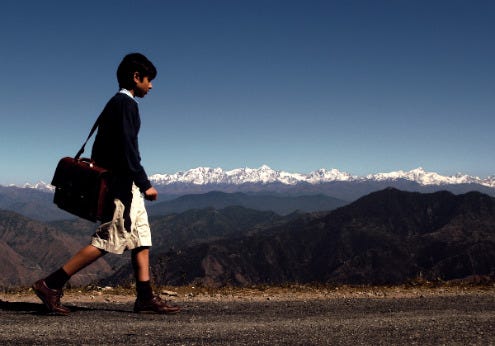Rahul Gandotra, "The Road Home"

Filmmaker Rahul Gandrotra's semi-autobiographical short film "The Road Home," about a young boy native to England, but tied by blood to India, is playing at the Heartland Film Festival. In this interview Gandotra discusses the genesis of his story, making short films, and converting them to feature-length productions.
Click here for showtimes for "The Road Home."
Where did the idea come for this film?
The story is somewhat autobiographical; I tried to convey the feelings and issues I went through when I first went India to this boarding school. I was born and raised in England and so I felt British in my bones. But when I was sent to this boarding school, it was my first significant period of time in India. One could say that I was an immigrant to this country even though I didn't look like it.
And because I looked Indian, everyone in India expected me to know the language, to know the food, to know the customs. There was a constant list of expectations and judgements made about me primarily because of my skin color or racial features. Of course, this is very understandable, but when they are kept being made after I would try to explain to them that I was British, I was made fun of or teased quite harshly. So the story comes from real life experience.
You're making this short into a feature, right? Can you talk about making a short into a feature, and how you got to that point?
My short film is essentially a road movie. Typically these type of films need time in which to build the story and the characters. One shouldn't normally do a road movie in the short film format, as the length makes it very difficult to allow for a transformation of the main character. This made the short very difficult to write, because I had to find a way of having the character learn something by the end of the film that felt believable and realistic for me.
This was sheer torture to do and led to writing nine drafts of the script before shooting the film. So probably I would say that the structure and themes of the film lend itself easier to a feature film length. Writing the longer version, which is now been completed, has proved much easier as we have a lot more space in which to explore the characters and allow for a gradual transformation.
However, I couldn't just take the story in the short and expand it literally into a feature. A boy going around in a taxi for ninety minutes would make for a boring film indeed. So we've had to weave in different elements to make the feature work. Instead of one kid running away, for example, there is now two. There is also a whole subplot that involves someone chasing after them, which ties into the main story.
What do shorts have to offer that feature films perhaps cannot?
You can experiment with film grammar and styles of filmmaking that you can't necessarily do with features, where the feature film generally dictates a more scene-by-scene storytelling.
Sometimes these experiments can lead to wonderful results, sometimes they don't. Some examples of shorts that could never be done for a whole feature are "Copy Shop", "Terry Tate Office Linebacker", "Manon on the Asphalt", "Cashback", and "Logorama" (the latter three you can download and view on iTunes to get a sense of what I mean by experiments that couldn't be done in a feature).


